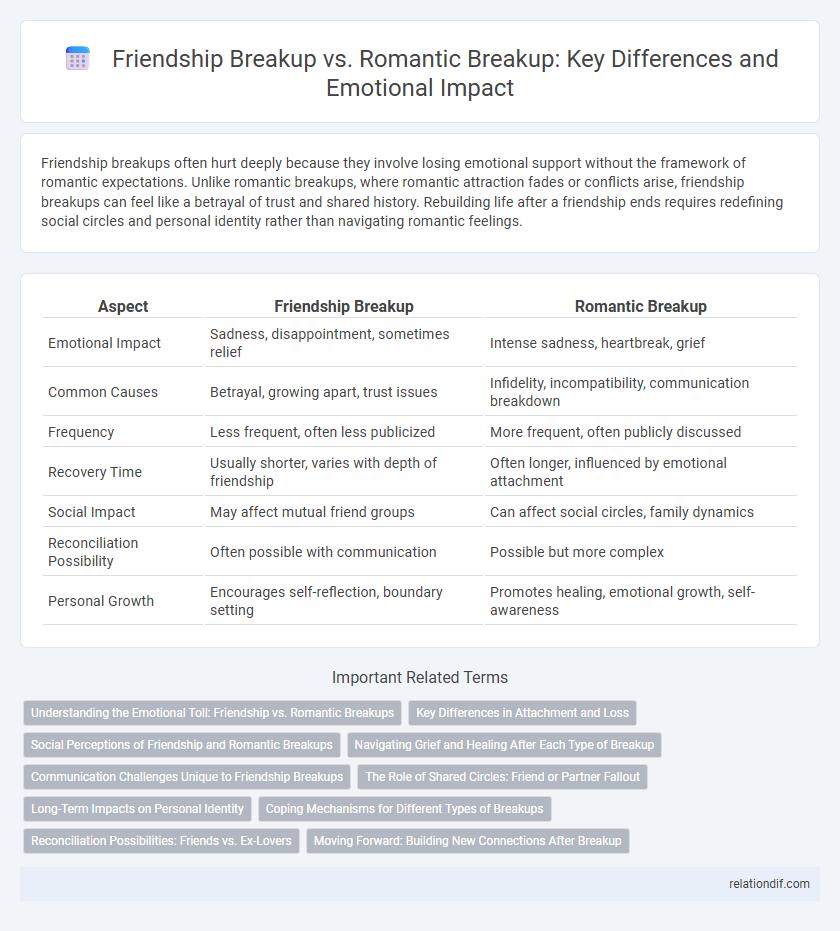Friendship breakups often hurt deeply because they involve losing emotional support without the framework of romantic expectations. Unlike romantic breakups, where romantic attraction fades or conflicts arise, friendship breakups can feel like a betrayal of trust and shared history. Rebuilding life after a friendship ends requires redefining social circles and personal identity rather than navigating romantic feelings.
Table of Comparison
| Aspect | Friendship Breakup | Romantic Breakup |
|---|---|---|
| Emotional Impact | Sadness, disappointment, sometimes relief | Intense sadness, heartbreak, grief |
| Common Causes | Betrayal, growing apart, trust issues | Infidelity, incompatibility, communication breakdown |
| Frequency | Less frequent, often less publicized | More frequent, often publicly discussed |
| Recovery Time | Usually shorter, varies with depth of friendship | Often longer, influenced by emotional attachment |
| Social Impact | May affect mutual friend groups | Can affect social circles, family dynamics |
| Reconciliation Possibility | Often possible with communication | Possible but more complex |
| Personal Growth | Encourages self-reflection, boundary setting | Promotes healing, emotional growth, self-awareness |
Understanding the Emotional Toll: Friendship vs. Romantic Breakups
Friendship breakups and romantic breakups both evoke significant emotional pain, but the nature of this distress differs due to the unique bonds involved. Friendship breakups often trigger feelings of betrayal and loss of trust, impacting one's social support network and sense of belonging. Romantic breakups typically involve deeper emotional and physical intimacy, leading to more intense feelings of grief, rejection, and sometimes identity disruption.
Key Differences in Attachment and Loss
Friendship breakups often involve a loss of communal support and shared experiences, whereas romantic breakups typically trigger more intense emotional attachment due to intertwined life plans and physical intimacy. Attachment styles in romantic relationships tend to be more complex, incorporating elements of passion, commitment, and exclusivity, which amplify feelings of loss during a breakup. The grief experienced from ending a friendship may focus on disrupted trust and companionship, whereas romantic breakups frequently provoke deeper psychological distress linked to identity and future uncertainty.
Social Perceptions of Friendship and Romantic Breakups
Social perceptions often view romantic breakups as more emotionally intense and socially significant than friendship breakups, despite both involving loss and adjustment. Romantic breakups receive greater societal attention and validation, which can lead to misunderstandings about the depth and impact of ending close friendships. This disparity influences how individuals process grief and seek support, shaping cultural narratives around relationship dissolution.
Navigating Grief and Healing After Each Type of Breakup
Friendship breakups often involve unique emotional layers, including the loss of trust and shared experiences, which require intentional reflection and rebuilding of social connections for healing. Romantic breakups typically intensify grief through added elements of intimacy and future planning, necessitating focused self-care and boundaries to foster recovery. Both types of breakups benefit from practices such as journaling, therapy, and support networks to navigate the complex emotions involved and promote long-term emotional resilience.
Communication Challenges Unique to Friendship Breakups
Friendship breakups often involve communication challenges distinct from romantic breakups due to the absence of clearly defined relationship milestones and societal scripts. Friends may struggle to articulate the reasons for drifting apart, leading to ambiguous or incomplete conversations that hinder closure. Unlike romantic breakups, where emotional expressions are more expected, friendship dissolutions often face suppressed feelings and unspoken grievances, complicating honest dialogue.
The Role of Shared Circles: Friend or Partner Fallout
Shared social circles intensify the impact of both friendship and romantic breakups, as mutual connections often become intertwined in the fallout. In friendship breakups, the dissolution may lead to subtle realignments within the group, while romantic breakups can cause more pronounced divisions due to emotional complexities and overlapping commitments. Navigating these shared networks requires careful communication to maintain harmony and prevent long-term social fragmentation.
Long-Term Impacts on Personal Identity
Friendship breakups often lead to a profound reevaluation of personal values and social identity, as these relationships are deeply embedded in day-to-day support networks and shared experiences. Unlike romantic breakups, which primarily affect emotional intimacy and future relational expectations, friendship losses can disrupt long-standing social roles and self-perceptions formed over years. Long-term impacts include shifts in trust, self-esteem, and the reconstruction of one's social identity, highlighting the unique significance of friendship in personal development.
Coping Mechanisms for Different Types of Breakups
Coping mechanisms for friendship breakups often involve seeking support from other friends and engaging in self-reflection to rebuild trust and social connections, whereas romantic breakup strategies frequently emphasize managing emotional pain through therapy, physical activity, and redefining personal identity. Emotional intensity tends to be higher in romantic breakups, making activities like journaling and mindfulness crucial for processing complex feelings. Tailoring coping approaches to the specific dynamics of friendship or romantic relationships enhances emotional recovery and promotes long-term well-being.
Reconciliation Possibilities: Friends vs. Ex-Lovers
Friendship breakups often allow for easier reconciliation due to the absence of intense emotional entanglements and romantic expectations, facilitating open communication and mutual understanding. In contrast, romantic breakups involve complex emotional wounds, attachment issues, and potential jealousy, which can create significant barriers to rebuilding trust and closeness. Studies show that while 60-70% of friendships can recover post-conflict, only about 30-40% of romantic relationships successfully transition back to friendship after a breakup.
Moving Forward: Building New Connections After Breakup
Moving forward after a friendship breakup involves rediscovering self-identity and embracing new social opportunities. Building new connections requires intentional effort in expanding social networks through shared interests, community involvement, and open communication. Unlike romantic breakups, friendship endings often allow faster emotional recovery, facilitating smoother integration into fresh, meaningful relationships.
friendship breakup vs romantic breakup Infographic

 relationdif.com
relationdif.com